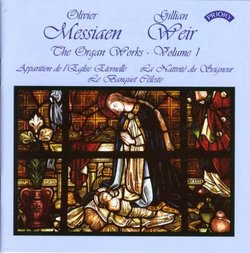| All Artists: Olivier Messiaen, Gillian Weir Title: Olivier Messiaen: The Organ Works, Vol. 1 Members Wishing: 0 Total Copies: 0 Label: Priory Records UK Original Release Date: 1/1/2003 Re-Release Date: 10/28/2003 Genre: Classical Styles: Chamber Music, Historical Periods, Classical (c.1770-1830) Number of Discs: 1 SwapaCD Credits: 1 UPCs: 028612209215, 5028612209210 |
Search - Olivier Messiaen, Gillian Weir :: Olivier Messiaen: The Organ Works, Vol. 1
 | Olivier Messiaen, Gillian Weir Olivier Messiaen: The Organ Works, Vol. 1 Genre: Classical
|
Larger Image |
CD Details |
CD ReviewsProfound, mystical, otherworldly altoman | Springfield, VA | 03/03/2004 (5 out of 5 stars) "Olivier Messiaen wrote profound, mysterious, ecstatic, occasionally disturbing music, depicting some of the central tenets of the Christian faith in sound. His musical language is unlike any other, and will not be to all tastes--indeed, it has not come as an easily-acquired taste for me. However, for those who can enter his musical world, this recording will be treasured. It features three of Messiaen's greatest and most accessible works.Apparition de l'Eglise Eternelle is in the form of a great arch--not inappropriate given that arches are characteristic of cathedral architecture. Immediately, it takes the listener out of traditional Western music by avoiding regular meter or a traditional Western scale as its musical basis; instead, it uses one of the "modes of limited transposition" developed by Messiaen. The vision slowly and inexorably unfolds to an overwhelming central climax when the eternal Church is revealed in all its triumphant glory, an overwhelming moment (marked fffff in the score). The vision then recedes. If there is one quibble I have with this performance, it is at the very end. In Messiaen's 1985 revision of this work, he made it clear that it should begin forte, but end pianissimo; most performers begin and end at virtually the same dynamic, and although Weir makes a clear dynamic contrast, I wish she had made a little more out of the diminuendo at the end.La Nativite du Seigneur is a set of nine meditations on the birth of Jesus; probably the most famous movement of the set is the final one, Dieu Parmi Nous. Weir draws wonderful colors from the organ throughout the set. There is an apt naivete in the movement about the shepherds, Les Bergers, and the beating of angel wings can be heard clearly in Les Anges. Dieu Parmi Nous, however, is Weir's great triumph. She does not play this superficially as a flashy toccata, a temptation to which so many organists succumb. The opening descent of Christ to earth is more deliberate than most, and I loved this interpretation--it was far more thoughtful than I had ever heard this played. (Wouldn't the Incarnation have been deliberate, not impulsive as so many organists make it sound? One sometimes gets the inpression that Jesus could hardly wait to leave his Father's side.) When the time comes to really toccata, though, Weir can do it with the best of them--the ending section of the piece is just magnificent.The last piece on the disc is Le Banquet Celeste. One might think that concluding a disc with a soft and very slow and static work would be a very bad idea, but it was brilliant. This is a hypnotic work. Having played it myself a number of times, I can only say that an organist playing this work must enter a different world in order to bring it off--a timeless world where each chord has its own life. Momentum, although hardly perceptible, must still be there lest the music die. Weir keeps you hanging on every chord, makes you live the chord until the next one comes along.A word about Messiaen's own recordings of these works, made in mono in the 1950's. I know that his performances must be definitive, but I cannot believe that the recordings were made on such a poorly tuned organ--it is so distracting that I cannot bear to listen to them for his interpretation. I would note, however, that both Messiaen and Weir take over 10 minutes to play Apparition; when I played it using Messiaen's own metronome marking, it came in at around 8 minutes. Ten is better by far.Weir is brilliant, the sound is magnificent, and the music is truly otherworldly. This disc is a great introduction to the music of Messiaen for the venturesome who are able to allow themselves to enter Messiaen's world. It is also a great introduction to the extremely brilliant, emotive and spiritual playing of Dame Gillian Weir."
|

 Track Listings (11) - Disc #1
Track Listings (11) - Disc #1